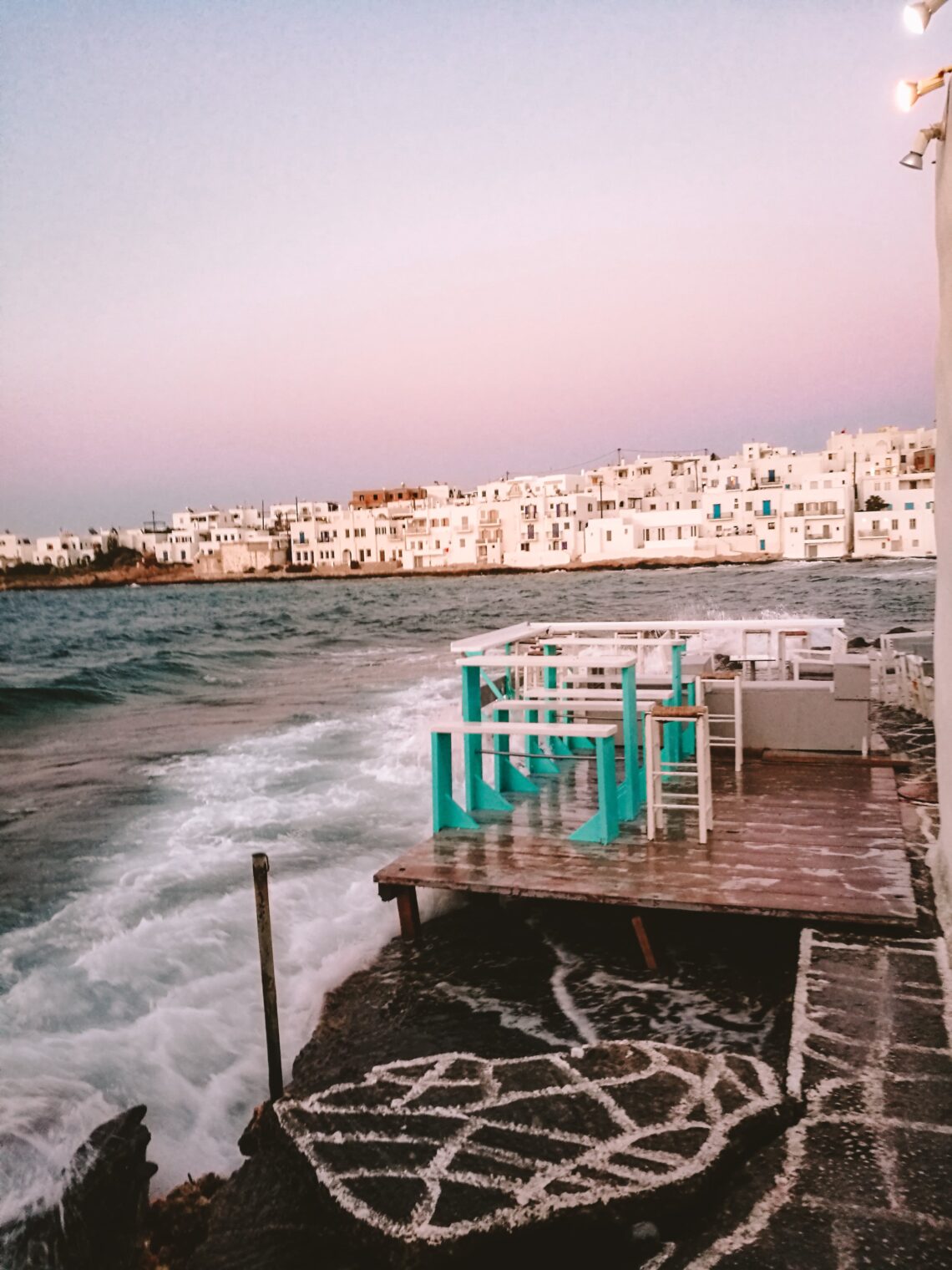
Planning a Trip to Greece: Travel Guide and Tips
Some posts on this website contain affiliate links. I receive a small commission if you use the links at no extra cost to you.
Planning a trip to Greece? It’s a good idea! You will not regret it, and you will have an amazing holiday time. Greece is just a perfect place and a complete vacation destination. There is everything you need for a perfect holiday: great beaches, sun and sea, historic sites, delicious food, water sports, a chilled atmosphere, and more.
In this article, I will give you a lot of tips regarding planning a trip to Greece.
Which places to visit, where to fly to, Greek currency, language, and many more. You will find here a complete guide that will help plan your trip to Greece easily and quickly.
Quick links to organise your trip to Greece:
Accommodation: Booking.com
Ferries: Ferryscanner
Guided tours: Get Your Guide
Here for checking and booking flights.
Here, you can compare prices and book a rental car.
Does Greece use the Euro?
Yes, Greece has been a member of the European Union since 1981 and has adopted the Euro. Greece has used the Euro since 2002.
In Greece, you can widely pay with the card. Remember, though, to have some cash with you. You may need it in smaller villages, on food markets, to pay for bus tickets or taxis.
The currency in Greece before the Euro was called the drachma.
Read more about drachma, euro in Greece and financial tips here.
Is Greece in EU and Schengen
Yes, Greece is a member of the European Union and a member of Schengen.
If you are coming from the UK or the USA, you don’t need a visa for tourism-purposes trips up to 90 days (in any 180 days). You will need a passport to cross the border.
Language spoken in Greece
What’s the language spoken in Greece? It’s a Greek language, as simple as this. More exactly, it’s called Modern Standard Greek, and it’s a descendant of Ancient Greek.
Greek in an independent branch of the Indo-European family of languages. It’s not a Slavic language.
Modern Greek uses the Greek alphabet, which has 24 letters.
Don’t worry if you don’t read the Greek alphabet. In any tourist places, people speak English, and you can also find English menus in restaurants, etc.
Read more about Greek language, its origin, group, minorities here.
Planning a trip to Greece: A Bit of Geography
Greece Time Zone
Greece is in Eastern European Time (same as Romania or Bulgaria). It is EST in winter (GMT+2) and EEST in summer (GMT+3).
So it’s two hours later in Greece than in London and one hour later than in Paris or Berlin.
Capital of Greece
The capital of Greece is Athens. It’s the biggest city in Greece and in the first tenth of the biggest urban areas in the EU. It has over 3 million inhabitants.
Athens’ name comes from Athena, the ancient Greek goddess of wisdom. It’s one of the oldest cities in the world, with recorded history dating back 3,500 years. You can visit one of oldest monuments here. That’s why the Greek capital is widely visited by tourists. It’s also a transportation hub. The city has an airport and three harbours, from which you can take ferries to islands.
Greece Neighbouring Countries
Greece has four direct neighbouring countries: Albania, North Macedonia, Bulgaria, and Turkey.
It also shares maritime borders with Cyprus, Egypt, Italy, and Libia.
Planning a trip to Greece: Deciding where to go in Greece
I think the first thing that you need to do when planning a trip to Greece is to think about where you will actually go. Greece is a big country; it has a mainland, cities, but also many islands, more and less known. You will need to choose a few locations that you want to visit.
Think about:
How much time will you have in Greece?
Do you want to visit actively or rather rest calmly?
Do you want a circuit trip with changing places or, rather, more stationery?
Do you want to go to more touristy, known, and busy places (like Santorini) or are searching for something off-beaten-track?
Do you want to organise your trip yourself, or will you travel with the agency or go on guided tours?
Only after you have the answers on these questions, you can plan the trip in detail. It’s hard to say ‘what you should do’ or ‘what’s the best’, as it really depends on your preferences. A partial answer to a few of these questions you will find in this article.
Remember that:
- You will not see all the great places; it’s just not possible.
- Don’t overpack your trip. You need to have time to actually enjoy Greek chilled atmosphere. Also, in summer, it’s just hot, and it’s not easy to run from place to place.
- If you want to visit islands, pick one group of islands that are close together.
- If you travel during the highest season, book your transport, especially ferries and accommodation, especially on small islands, in advance.
How to travel to Greece
As always, it depends on where you come from. If you will be travelling to the Greek mainland from Central or Southern Eastern Europe, you can use a car, bus, or even train.
It’s also possible to take a ferry. There are ferries from Italy (from Ancona, Venice, Bari, and Brindisi) and from Albania (to the island of Corfu).
Ferry transport in Greece is very important, and we will talk about it in the next chapters. Here, let’s focus on flights, as this is how most people will arrive in Greece.
Planning a trip to Greece: Where to fly into
The biggest airport with a huge number of flights from different directions is in Athens. It’s Athens International Airport Eleftherios Venizelos and has the airport code: ATH.
You can use this airport to arrive in Greece and start your visit, or change a flight to go to your final destinations, like any island.
More about the best Greek airlines and connections I will describe in a separate article soon.
There are more international airports in Greece. You can arrive there with direct flights from many European cities, especially during the summer months. There are charters, standard airline flights, and low-cost flights.
Greek airports in summer are very busy, so take it into consideration if you travel during peak season.
Additionally, there are airports with international flights in:
Thessaloniki, Preveza, Kalamata, Kavala, Volos, and Patras are on the Greek mainland.
International airports on the islands: Corfu, Zakynthos, Kefalonia, Santorini, Mykonos, Kos, Rhodos, Samos, Skiathos, Lesbos, and on Crete island: Heraklion and Chania airports.
There are also smaller local airports on a few islands. It means you will not be able to land there if you are travelling from any other country, but you can arrive there with Greek airlines from Athens.
Such airports are, for example, on the islands: Kalymnos in the Dodecanese Islands or Naxos in the Cyclades archipelago.
Check out the article about Greek airlines and options to fly to Greece from the USA and Europe soon.

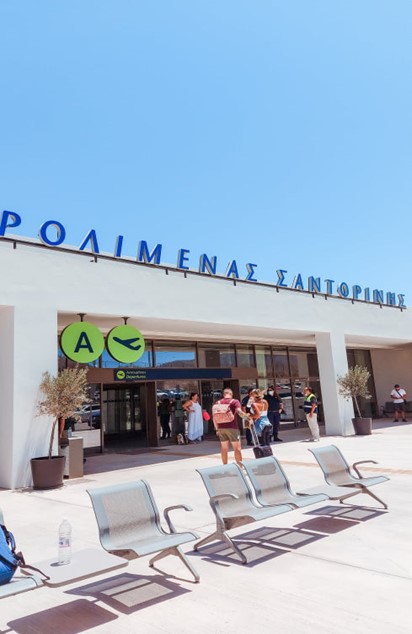
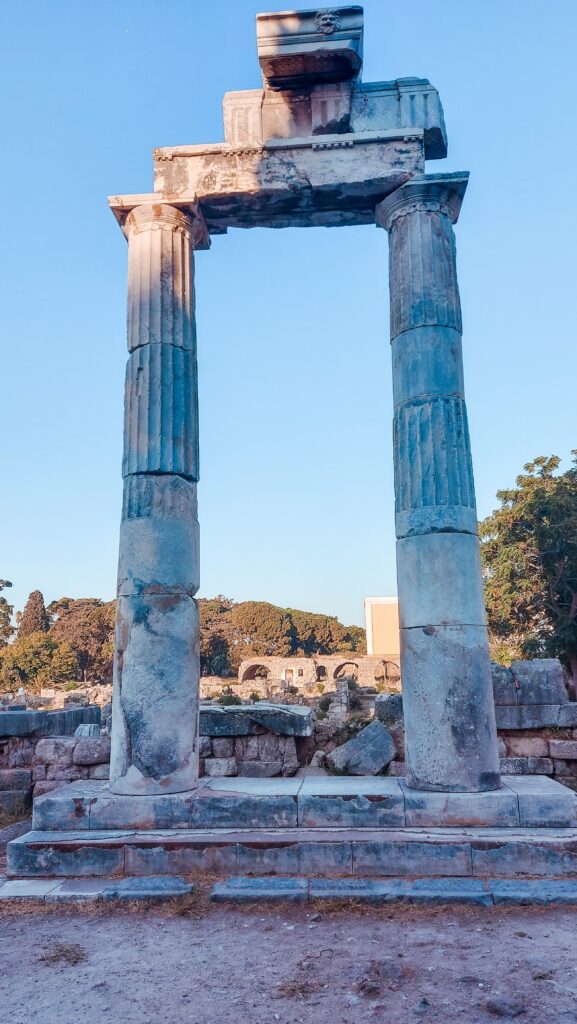
Planning a trip to Greece: Island Hopping
Greece has over 6,000 islands and islets, of which 227 are inhabited. The Greek Islands are amazing and very addictive. You visit one, and you want to see the next ones. I adore the views and the atmosphere of the Greek islands. And the atmosphere of island hopping. Greece is the best place for an island-hopping trip.
You stay for some time on one island, then take a ferry to the next one. How many islands should you visit during such island hopping? It depends on the number of days that you can dedicate to it. It’s best to spend at least 2-3 days on each island.
If you are planning to spend a lot of time in Greece (at least a month or more), then you can combine different, even the furthest, locations. But if not, organise your island-hopping in one group of islands. Don’t try to incorporate islands from different groups; you will just spend too much time on ferries.
What are the groups of Greek islands
There are 7 Greek island groups: Ionian Island, Saronic Islands, Cyclades, Dodecanese Islands, Sporades, North Aegean Islands, and two ‘other’ islands, meaning Evia and Crete.
From all of them, the Ionian Islands lie on the Ionian Sea, the rest on the Aegean Sea.
Here you can read more about all the Greek groups of islands. It’s not easy to choose which one is the best for you, as they all have something special about them, but hopefully the article will introduce the topic of island groups a bit more.
To organise your island-hopping trip, use portals where you can search for and buy ferry tickets, for example, Ferryscanner.
Planning a trip to Greece: Accommodation
When it comes to accommodation, it depends on where you travel. If you travel to the biggest and most touristic islands, you will find big resorts and hotels with ‘all-inclusive’ food options.
What I really like and recommend the most is staying in smaller hotels, like family-run hotels. They are the most typical in Greece, especially on islands. With typical nice Greek architecture, flowers, and quite often a small swimming pool. Sometimes you can also have breakfast.
I wrote a roundup of 5 great hotels on different islands. All of them were checked by me personally. Have a look, as they were absolutely worth staying at and affordable.
If you are looking for accommodation, use Booking.com, as you can find different types of accommodation. I always use it when booking places in Greece.
Remember to book accommodation in advance, especially if you are planning to visit smaller islands, as options are limited.

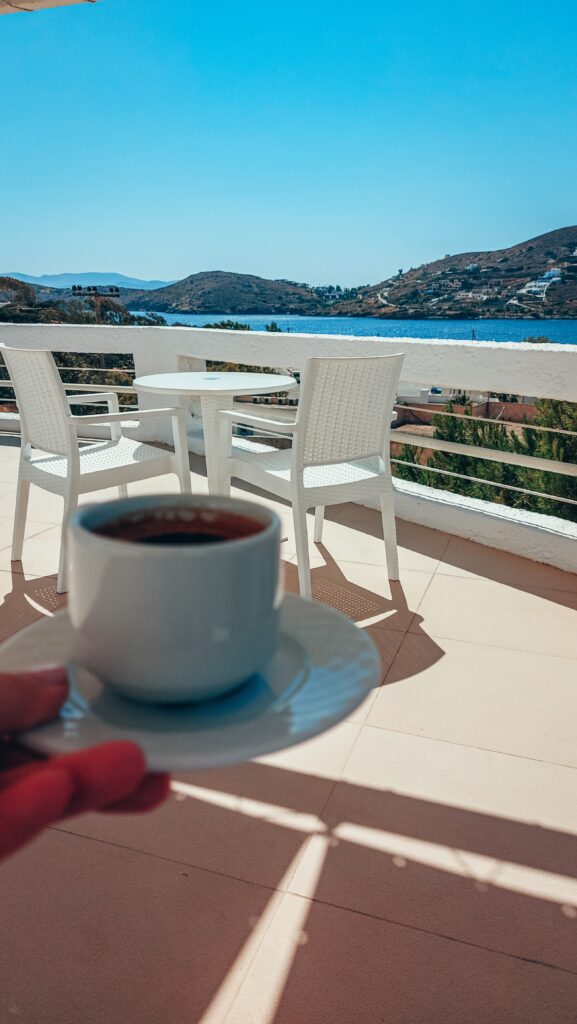
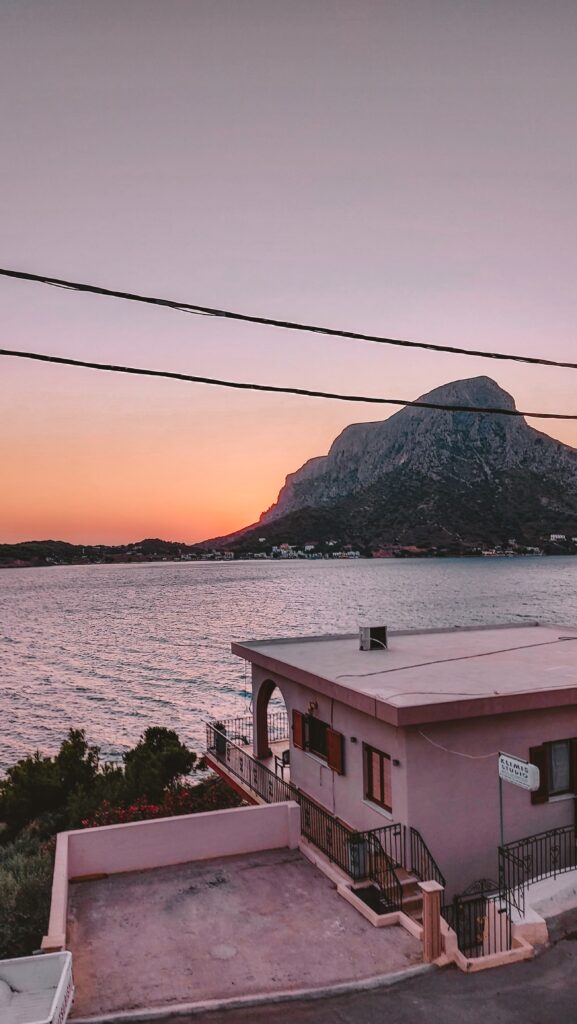
Planning a trip to Greece: An Example of Itinerary
Let’s look at the example itinerary that many tourists quite often do, with different modifications, of course.
If it’s your first time in Greece and you want to grasp as much as possible from this trip, it’s probably the best option. During the trip, you will see the monuments of Athens, travel by a ferry, and do some island hopping. You will see the most famous island, but also this smaller and less known ones.
I have two itinerary proposals:
Athens- Santorini-Ios-Folegandros-Santorini or Athens to fly back
Athens-Amorgos-Koufonissia-Naxos-Athens to fly back.
Both trips will start in Athens, where you land. You will spend around 2-3 days in Athens. It’s not enough time to see everything, but enough to see the most important points, like the Acropolis Museum or Plaka.
Then, you have a few options. What to do after Athens? If you want to see the most famous island, Santorini, you can take a flight or go by a ferry. If you prefer to skip it (as it can be quite tiring because of its popularity), take a ferry to other islands in the Cyclades group. Why do I advise connecting Athens with Cyclades? They are one of the closest to Athens. They are beautiful; sometimes they are called ‘the most Greek of Greek islands’. You find there everything you can think of when it comes to Greek islands. And it’s very easy to do island-hopping on Cyclades.
Trip with Santorini
On Santorini, spend at least 3 days. See Oia, Fira, and other landmarks. Santorini is not a typical ‘beach island’, but there are other interesting points to visit. And, most important, views!
You will not find such views anywhere else: white, shiny houses on dramatic cliffs, blue water, and blue domes.
Just remember, Santorini is a very touristy island that is busy, crowded, and expensive.
Where to stay in Santorini? I described hotels on this island in this blog post.
Here, you can read how to get to Santorini and how to move around on the island.
After Santorini, take a ferry and visit the next Cycladic islands. Most people would probably think about going to Mykonos. But you were already on this very popular island. So maybe let’s look at something less known? On the way from Santorini to Mykonos, there is the Island of Ios. It’s quite touristic as well, sometimes called ‘cousin of Mykonos’ because of party options. It has an absolutely beautiful, colourful Chora and nice sunset spots. From Ios, hop to Folegandros. It’s a smaller island, but again, it has everything you need: amazing Chora to wander in the streets, views, and the colour of water.
From Folegandros, you can go back to Athens or go back to Santorini, from where you can fly or take a ferry.
If you have more time, you can also travel from Santorini to Crete. It’s the largest island in Greece, so you will not see it all, but it’s so worth visiting as well. Especially Chania town and the southern-west region called Sfakia.
Trip with Amorgos
If you don’t feel like getting into Santorini tourist hassle, take a ferry to Amorgos Island. The atmosphere of the island, the streets and flowers in the main town (Chora), views of rocks, cliffs, and water, it’s really an amazing place. From there, you can take the ferry to one of the so-called ‘Small Cyclades’, for example, to Koufonissia, which is the closest and easiest to reach. It’s a small island with only one village and a very relaxing and beach atmosphere. From here, you can go to the more known and biggest of all Cyclades, Naxos. It is a touristic island, yet it keeps its local character. You will find here beautiful beaches and ancient monuments. From Naxos, you can take the ferry to Athens or even fly. There is a local airport on the island.
Trips to other islands
If you want to see Ionian islands like Corfu, or Dodecanese like Rhodos or Kos, it probably would be a better option to fly there directly (or via Athens) without visiting Athens and taking ferries. It’s just pretty far, so it’s not the best option if you have limited time for your trip.

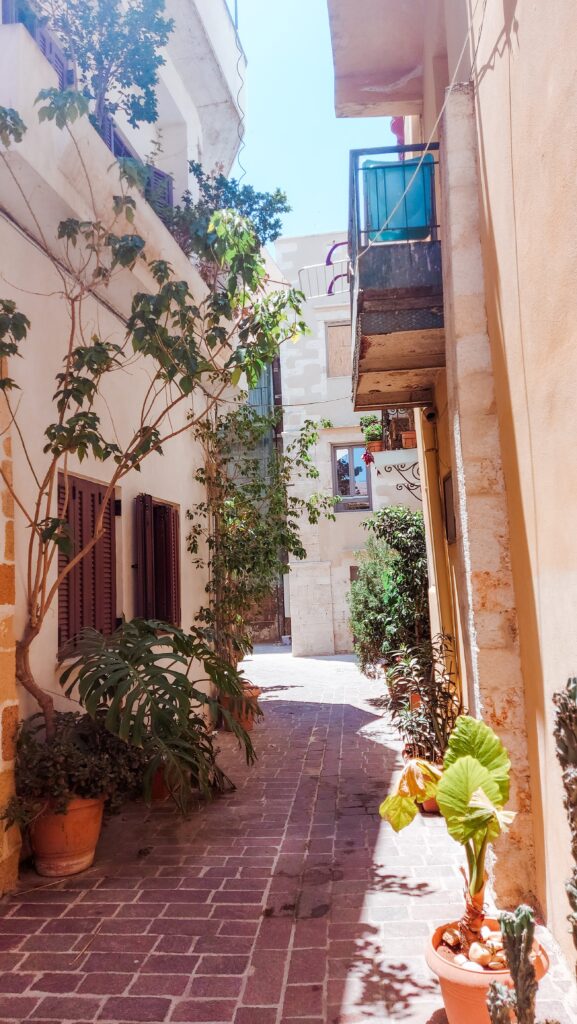
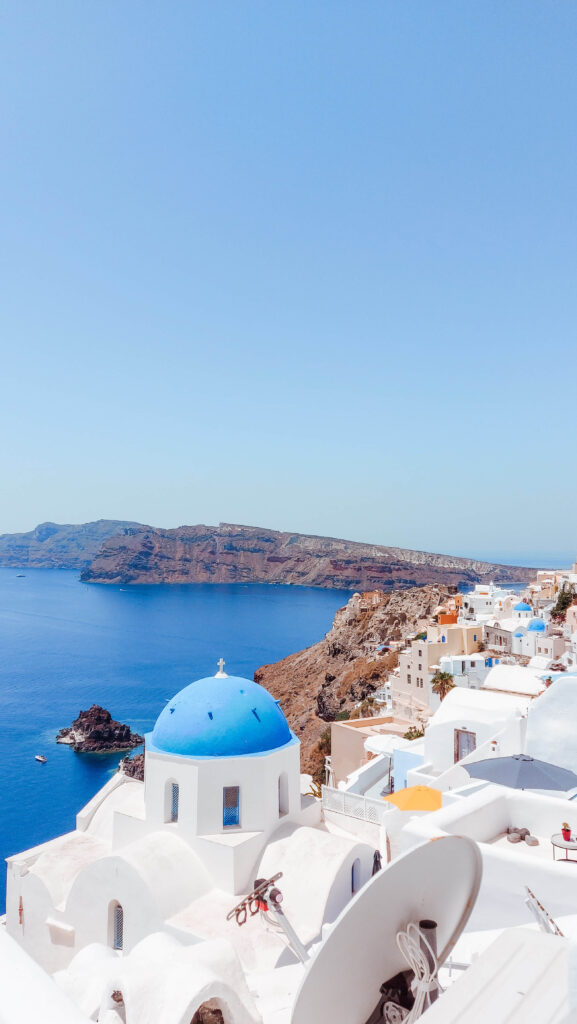
Best time to visit Greece
Most people visit Greece in the summer season. The high season is July and August, especially August, when Greek people also travel to islands. I think the best time to visit Greece is the second half of May, June, or September. It’s already (or still) very summery and you can sunbath or swim. As it’s not the highest season, it’s a little less crowded and can also be cheaper.
I avoid travelling to Greece in August (it’s also usually the hottest month).
Planning a Trip to Greece: Other Greece Travel Tips
Let’s look at any other Greece travel tips that will help you prepare for your trip.
Christmas and Easter time in Greece
Christmas in Greece takes place on December 25th and 26th. Easter takes place according to the Orthodox (Julian) calendar, so it takes place after Easter in western European countries.
Greece Voltage and Plug Socket Type
Greece uses the same plug socket type as other European countries. These are ‘Euro’-called plug types: type C and type F.
The standard voltage in Greece is 220 – 230 V. The frequency is 50 Hz.
If you are coming from the UK, you will need a plug adapter. If you are coming from the US, you will need a combo of plug adapter and voltage converter.
What is the drinking age in Greece
In Greece, alcohol can be sold or served to people starting at 18 years old.
Planning a Trip to Greece: Costs of holidays in Greece
It’s not possible to answer, as it really depends on many factors and your travel style. If you visit Santorini or Mykonos and stay in the luxury hotels, it will be expensive. But you can find cheaper, standard, and affordable accommodations everywhere too. Generally, I would say, looking at the costs of accommodation and food, that Greece is quite affordable. It’s not as cheap as a few other Southern-Eastern Europe countries like, for example, the Balkans, but it’s also cheaper than, for example, Spain or Italy.
Can you drink the water in Greece?
You can, if you are in Athens or Thessaloniki. You shouldn’t, if you are in rural locations or on the islands. When on islands, you will see that everyone drinks bottled water, which you can get everywhere.
Driving in Greece without an international licence
Tourists from European Union countries don’t need international driving licences in Greece. There is also quite a new law implemented in 2021 regarding tourists from the UK, USA, and Australia. You can drive using your home licence, for example, a US licence. There is no need for international driving licences for citizens of the mentioned countries. Others still need international licences.
What to wear in Greece
It depends on the time of your trip. If you are travelling in the summer months, most likely you will need only summer clothes. Pack some long sleeves to use during windy evenings (especially on the islands).
Of course, don’t travel without a swimsuit.
Most importantly, always have with you a hat, sunglasses, sun cream, and water. These are essential things. In summer, it can be extremely hot, so it will help you stay hydrated and protected from the sun.
If you travel in the spring or winter, you will need warmer clothes and shoes.
The type of clothing also depends on the location. There are places where the atmosphere is more chilled and places with nicer clothes and more elegant evenings, for example, in Mykonos or Santorini.
What to bring from Greece as a souvenir
Because of the amazing cuisine and rich history, there are really many things you can bring home as a souvenir. I always recommend thinking about bringing food that you can use later and feel a bit of holiday atmosphere at home.
Check out the article, Best Greek Souvenirs to Bring Home for details!
Greek Food
Greek food needs a separate description; it’s not something you can say about it in a few sentences. Certainly, if you are in Greece, you need to eat a lot; you have no choice. Prepare to go out to eat in tavernas. You can also visit any food market, bakery, or even supermarket and buy local products and some snacks like bougatsa, fruit, olives, and olive oil with bread.
In tavernas, eat typical local dishes: horiatiki, a Greek salad with feta cheese, dakos, and moussaka. The Greek cousin is great for everyone; there is meat and seafood, but also a lot of vegetables, so even vegetarians and vegans will find some dishes.
If you like wine, Greece is a great place for you. You can drink it in every restaurant and go for wine tastings at wineries as well. And coffee. There is no day without stops for coffee when being in Greece.
Planning a Trip to Greece: Summary
In the article, we looked at Greek geography, currency and visas, other practical tips, and travel information like how to decide what islands to visit. Hopefully with all this information, planning a trip to Greece seems less overwhelming now.
Greece is an amazing country for vacation; have a great time there!
Interested in reading more about Greece? Check additional resources:
The best souvenirs from Greece to bring home
5 great hotels on the Greek Islands
Santorini:




